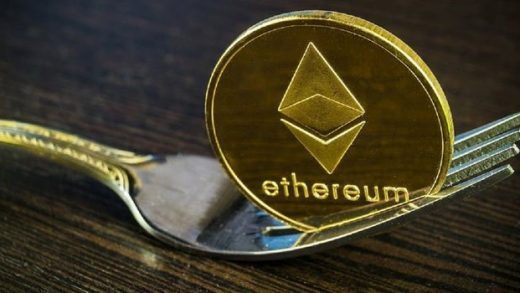
Ethereum (CCC:ETH-USD) is the world’s second largest cryptocurrency behind Bitcoin (CCC:BTC-USD). In this article, I’ll discuss the top 10 things you should know about Ethereum today. This list is, of course, subjective, but I hope you find it to be informative.

Source: shutterstock
What Are Ethereum and ETH?
First of all, you can explore Ethereum as a project by visiting its website. There, you can learn how to use Ethereum, what the developers are up to at this time and community news.
According to the website:
“Ethereum is a technology that’s home to digital money, global payments, and applications. The community has built a booming digital economy, bold new ways for creators to earn online, and so much more. It’s open to everyone, wherever you are in the world – all you need is the internet.”
Ethereum is currently the most used blockchain in the world.
ETH is Ethereum’s cryptocurrency with a market capitalization of about $310 billion and a market price of about $2,677 as of midday June 4, 2021.
What is the main difference Between Ethereum and Bitcoin?
The distinction between Ethereum and Bitcoin is that Bitcoin is considered to be a digital currency, while Ethereum is a ledger technology, used by developers and businesses to create new applications and programs via smart contracts. Smart contracts are collections of code that are used to carry out a set of instructions and run on blockchain technology.
Ethereum is highly programmable, much faster and more powerful than Bitcoin and it focuses on Decentralized Finance. Furthermore, ETH acts as a platform for numerous other cryptocurrencies.
Both Bitcoin and Ethereum are based on blockchain technology.
Can Ethereum Overtake Bitcoin?
This not easy to answer. It has to do with the supply, demand and mostly utility. According to Todd Morley, the co-founder and former executive of Guggenheim Partners, “Ethereum has ‘much higher utility’ than bitcoin—and is ‘where the action is.’”
“Ethereum, to me, has a much higher utility [than bitcoin] through smart contracts,” Morley told Bloomberg TV, warning that companies that don’t have a digital strategy risk “something” suddenly showing up “and your walkman looks like an abacus.”
Rather than just speculating on the price of cryptocurrencies, it is their utility and applications that will be the main catalyst for their future. It remains to be seen whether Ethereum will dominate Bitcoin, but it seems to have the potential.
Does ETH Have a Limited Supply?
In contrast to Bitcoin, which has a limited supply, ETH does not have a limited supply. It is therefore not supposed to have any deflationary effect. As of today, ETH has a circulating supply of 116,138,166.69 ETH. A big change has happened in late 2020 called Ethereum 2.0. The aim was to change the “proof of work” protocol to the “proof of stake” protocol.
A self-explanatory definition of these different protocols is given by an article on CNBC, which was published in December 2020.
“Like Bitcoin, Ethereum’s blockchain currently operates on a “proof of work” model. So-called “miners” with purpose-built computers compete to solve complex mathematical puzzles to validate transactions. Whoever wins that race is then awarded in bitcoin.
On Tuesday, the Ethereum blockchain is set to begin a transition to a “proof of stake” model. Instead of miners, the network will rely on “stakers” who already hold some ether to process new transactions.”
This change makes transactions much faster. But there is a main disadvantage according to Ethereum itself. “Proof-of-stake is still in its infancy, and less battle-tested, compared to proof-of-work.”
What Are the Price Predictions for ETH?
There are too many, from $5,000 to $20,000 or even more. A word of advice: don’t spend too much time or brainpower on these forecasts.
They are just opinions without any real validity behind them.
Do not assume that large hedge funds or institutional investors can predict the future price of Ethereum with accuracy. It is just a “clever” way to influence market sentiment once they have already built positions in ETH and hope to push the price higher. Nobody has a crystal ball to predict the future performance of ETH, not even on Wall Street.
So Is Ethereum a Good Investment?
The answer is twofold.
First, most central banks have warned against investing in cryptocurrencies, as they believe that cryptocurrencies are highly speculative currencies with no intrinsic value. They are for definitely too risky for some investors and traders.
Ethereum is a very volatile and investment, so be sure you’re comfortable with its risk before you decide to buy. If you think that Ethereum is the future of blockchain technology, and you have a well-diversified portfolio, consider whether your investment philosophy accepts risk. Only invest money you can afford to lose.
Is ETH a Mature Cryptocurrency to Invest in?
Back in 2020, ETH was priced at a range of $100-$700. In early 2018 it reached $1200, but a large crash occurred and ETH dipped to almost $100. With a price near $2700 today it has increased a lot, but it has fallen from highs near $4,000.
The crypto market is far from reaching “maturity” and stability. Expect both rallies and crashes.
Who Accepts Ether as a Means of Payment?
Many merchants are willing to accept payments in Ether in 2021, according to cryptonews.com.
Some of them include Digitec Galaxus (the largest Swiss online retailer), CryptoPet (pet supplies retailer), PizzaForCoins (service dedicated to buying pizza with cryptocurrency), and Snel.com (VPS hosting service). What is very important though is that Ethereum gains traction internationally, and there is a list of over 500 international companies who are members of the Enterprise Ethereum Alliance.
These companies support the Ethereum ecosystem, though not all of them accept Ethereum at this time.
What are the key uses of Ethereum?
The main takeaway is this:
“Ethereum has expanded on Bitcoin’s decentralized digital currency by building a global network that undergirds an interconnected marketplace of decentralized applications (dApps) — from decentralized autonomous organizations (DAOs) to Initial Coin Offerings (ICOs), stablecoins, decentralized finance (DeFi), and non-fungible tokens (NFTs). Ethereum’s use cases are vast and expanding fast, offering blockchain projects enhanced efficiency, security, and decentralized equity to industries across the globe.”
What Are the Main Pros and Cons of Ethereum?
According to TopCoins.com the main advantages of Ethereum are:
- “Reliability
- Ethereum 2.0 upgrade
- Sponsored by Large Companies
- Ethereum is Decentralised
- Lower Inflation Risk
- Ether is Not Capped
- It Attracts More Businesses
- First Mover Advantage
- Fast Deployment
- Ethereum is Transparent”
At the same time though, it seems to have plenty of disadvantages. The main ones are:
- “It Will Always Be Second to Bitcoin
- Scalability Issues
- Eth 2.0 is Causing Community Troubles
- Outrageous Gas Fees
- Transaction Privacy”











